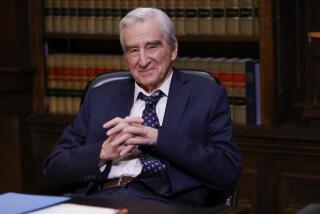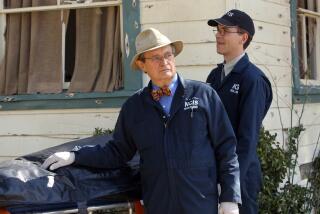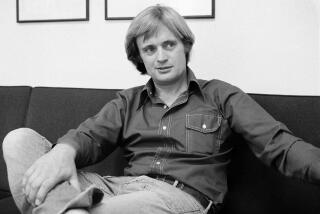McGoohan really had our number
- Share via
In the summer of 1968, the most important television series of my life premiered on CBS as a summer replacement for “The Jackie Gleason Show.” A British import about a spy who, having resigned his position, is drugged and kidnapped and wakes up captive in a fanciful holiday resort, where he is hectored week after week to explain himself, “The Prisoner” starred and was co-created by Patrick McGoohan, who died in Los Angeles on Tuesday at the age of 80.
Pop culturally, we were near the end of an age of spies. McGoohan himself, who had passed on a chance to be James Bond, was already known to audiences as John Drake, the hero of “Secret Agent,” whose theme song (written by Steve Barri and P.F. Sloan) became a hit for Johnny Rivers. “The Prisoner” was something different: Most every other spy, on movies and in television, was a glorified cop doing his (or, rarely, her) master’s bidding. To the extent that he was free, it was expressed in a tendency to do things “his own way,” but he was always first and foremost a company man. Whether his cause was just was something that he and we alike took for granted. It wasn’t part of the deal to question it, or to ask any questions at all.
By contrast, “The Prisoner” was a television show of ideas -- the inalienable if inconvenient right to self in a world that demands your cooperation, if not capitulation -- which also distinguished it from pretty much every other television show I had ever seen. The fact that I was just then working out that my own junior high school was a kind of jail made its appearance timely and amplified its meaning, as did most everything else about that chaotic summer of the battlements.
“The Prisoner” was more than an idea, of course: It was an idea personified, and while it’s fair to say that its artistic success was the lucky product of the work of many hands, it was McGoohan who made the series work. (That is perhaps why I am not yet more excited about AMC’s coming remake, set to premiere sometime this year.) It was, metaphorically, his own story, having quit “Secret Agent” at the height of its success because it no longer suited him to play that role.
Nearly 40 at the time (and the father of three), he was heroic in a way that mixed the self-reliance of the classic secret agent with the comedy of the new age’s anti-authoritarian tricksters. Good-looking, in an Everyman sort of way, he had a musical voice, a light step, a twinkling eye -- he was a bit of a John Lennon, come to think of it -- that in itself bespoke a kind of freedom. There was always humor in his contrariness, and if Number 6 was fated corporeally to remain a prisoner -- caught at the border by Rover, the bouncing ball from hell, or shown that his imagined escape was merely an illusion -- he remained himself. As hard as they tried, they could not wash his brain.
It is not McGoohan’s fault that he is so closely connected with that role in my mind that I cannot clearly assess his larger gifts as an actor. He played many parts before it, and many parts over the remaining, second half of his life, including the 1977 series “Rafferty,” several turns on “Columbo” and in the films “Silver Streak” and “Braveheart.” I was always glad to see him working, because I felt I owed him something, and though he was not the busiest of actors, he may have been as busy as he liked.
Having early in his career deprived himself of an annuity by passing on Bond (and “The Saint,” whose Roger Moore became Bond), he more recently turned down both the roles of Gandalf in “The Lord of the Rings” and Dumbledore in the Harry Potter films. This might have been for reasons of health, as has been reported, but I prefer to think of him once again exercising his right to be perverse: “I am not a wizard,” he might well have said, “I am a free man.”
--
More to Read
The complete guide to home viewing
Get Screen Gab for everything about the TV shows and streaming movies everyone’s talking about.
You may occasionally receive promotional content from the Los Angeles Times.







